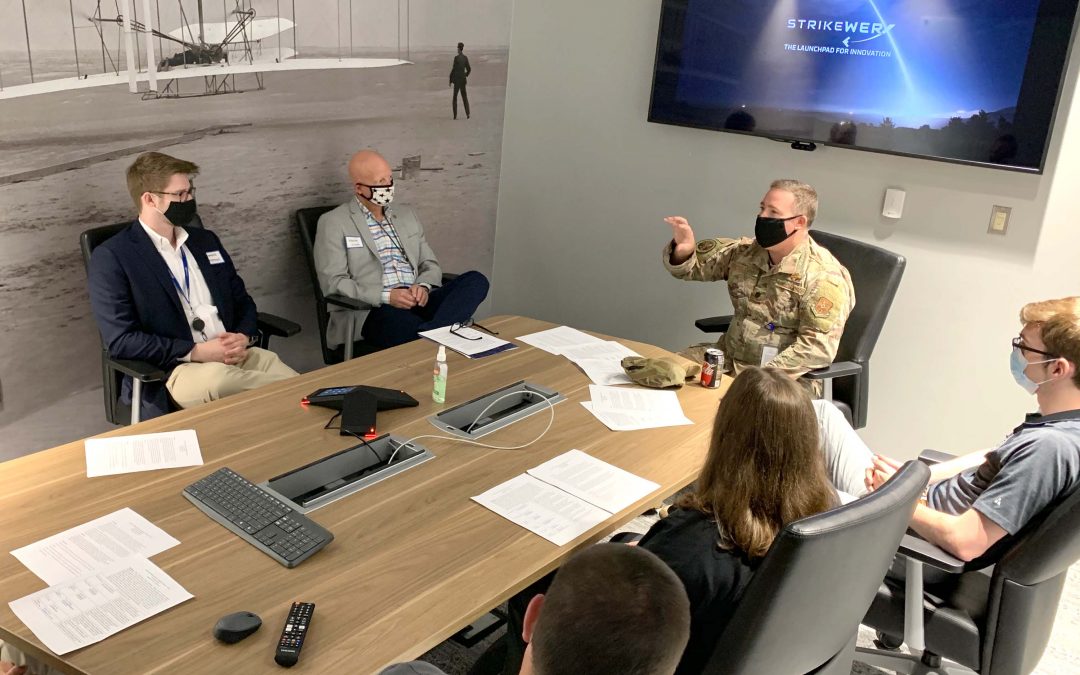Col. Ryan Chmielewski, PDEP project champion, addresses the Fellows working in the PDEP focus area during the Global Strike National Security Fellowship Program kickoff held Sept. 1, 2021 at the STRIKEWERX Innovation Hub in Bossier City, La. (Sean Green/STRIKEWERX)
By Sean Green | STRIKEWERX Director of Marketing & Communication
BOSSIER CITY, La. — Louisiana Tech University students are developing innovative solutions to challenges in Air Force Global Strike Command thanks to the Global Strike National Security Fellowship Program.
After a successful pilot year, AFGSC, Cyber Innovation Center in Bossier City, and Louisiana Tech Applied Research Corporation kicked off the second fellowship class on Sept. 1.
Administered through a Partnership Intermediary Agreement with AFGSC, the second year of the program has brought together 11 fellows and three professors from Louisiana Tech with four AFGSC Project Champions.
They are working to develop innovative solutions in three focus areas: Portfolio-Level Digital Engineering Platform; Nuclear Command, Control and Communications; and Knowledge Management.
Dr. Donna Senft, AFGSC chief scientist, said the partnership with Louisiana Tech is an important one, and the fellowship program has received “rave reviews.”
“We have a need for a lot of bright ideas. That is why we wanted to reach out to make use of the talent at Louisiana Tech,” Dr. Senft added.
Dr. Sumeet Dua, president of LTARC, said this project is a great example of how innovation happens at the university.
“This is a tremendous opportunity to work closely with AFGSC project champions, experiment, make mistakes, and ask questions,” said Dr. Dua. “As research students, very rarely do we get to see someone take our product and make it work.”
The fellowship program’s success lies in reinforcing the Command’s commitment to innovation and collaboration, strengthening the relationship between academic institutions and the Department of Defense, and presenting students the opportunity to gain real world experience.
Craig Spohn, CIC executive director, underscored the importance of fellows’ opportunity to help the U.S. Air Force, even after they graduate the program.
“As you do these projects, you’ll see how important what you do is. We need smart people,” said Spohn. “As you go on to do the great things that I know you’ll do, I hope you will stay in the area and contribute it — it’s you guys that are going to make this area a better place to live.”
Through the PIA, the Command can capitalize on existing local resources to create groundbreaking results. By executing the fellowship program through the CIC, costly contracts can be avoided while all sides work to grow capabilities.
“This program continuously aids fellows’ and AFGSC project champions’ efforts via mutually beneficial knowledge transfers,” said Lauren Wheless, fellowship project manager for CIC. “Fellows gain vital real-world experience while the Command forms meaningful relationships with academia to accomplish mission-critical technology transfer and transition objectives.”
Established in June of 2020, seven graduate and six undergraduate Louisiana Tech University students served in the first group of fellows. They collectively worked nearly 12,500 hours on their focus areas. They presented their final capstone projects in May. Many students from the pilot year are continuing their work in year two.


